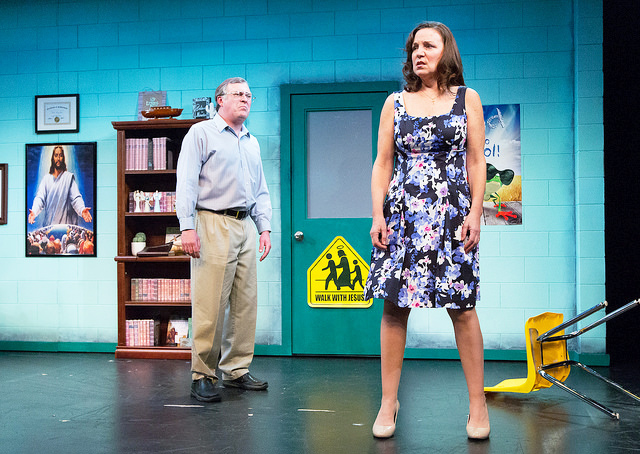
Hand to God, comedy by Robert Askins, Philadelphia Theatre Company, April 2017.
A former minister from Texas, Robert Askins, wrote a vicious denunciation of religious hypocrisy in his disquieting play, Hand to God. His dark comedy illustrates how pathetic are the attempts of many religious leaders in times of emotional need. It had success off-Broadway in 2011, on Broadway in 2015, and Philadelphia Theatre Company has revived it under the talented direction of Matt Pfeiffer.
Truth to tell, Hand to God didn’t astound me as much on this second viewing. This is not necessarily because the new production is flawed; indeed, two elements are better in Philadelphia than in New York. It’s simply hard to replicate shock the second time around, when you know what’s coming.
This play starts as a serene look at religious folks playing with hand-puppets in the basement of a rural Texas church. Margery is a recently-widowed woman in her forties who now devotes herself to teaching the word of God to young people through the presentation of puppet shows. Her adolescent son Jason is learning how to manipulate his hand puppet, whom he names Tyrone; his classmate Timothy is an oversexed teenager who lusts for his teacher; while Jessica is a sweet young girl-next-door. They’ve all been brought up to repress their emotions and to turn to the Bible to fill their needs.
We are jolted when Tyrone starts voicing profane obscenities, which clearly are the repressed feelings of his puppeteer, the shy, mild-mannered Jason. Then we recoil further when the hand-puppet bites off the ear of Timothy, sending blood gushing all over the stage. The action escalates with explicit sex and more blood. The Philadelphia production was much less gory than in New York.
Grace Gonglewski was superb as Margery. This esteemed actress has excelled in many different roles, and here surpassed herself as an uptight Southern belle who busts out of her cocoon. Margery truly is the protagonist of the drama, as she changes more than any of the other characters during the course of the play. Gonglewski revealed this even more vividly than did Geneva Carr in New York.
Matteo Scammell (who was the lead in Eugene O’Neill’s The Hairy Ape by EgoPo Classic Theater) was a powerful presence as Timothy, animalistic yet endearing. This was another advancement beyond the original.
Aubie Merrylees gave a versatile performance as Jason, engaging sympathy as the fatherless boy and snapping back-and-forth convincingly as he confronted his inner demon, Tyrone. The quick-change demands of this role call attention to whomever plays it but, as I pointed out, the key role is that of his widowed mother.
Veteran actor William Zielinski interpreted Pastor Greg as a compassionate older man, which missed the inherent predatory side of that character. On Broadway, Mark Kudisch, directed by Moritz von Stuelpnagel, played the pastor as younger and with a dark creepiness.
The fine sets were designed by Brian Sidney Bembridge and lit by Thom Weaver. Daniel Perelstein‘s sound design neatly incorporated organ hymns, gospel and rock ballads but that music was overly amplified to the point where it interrupted the momentum from each scene to the next.
Scammell and Aubie Merrylees:
